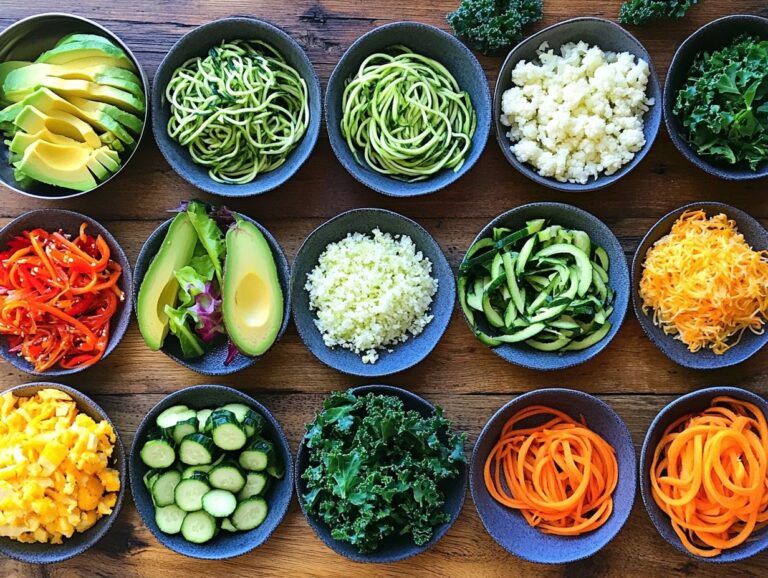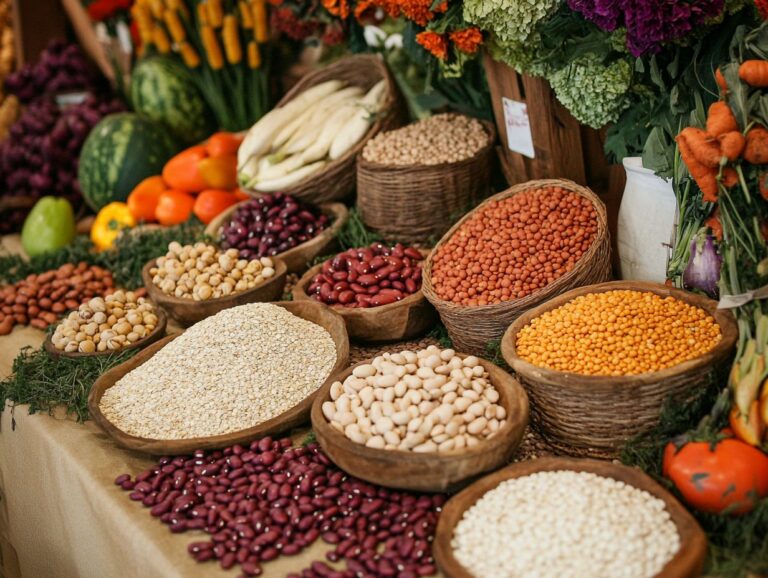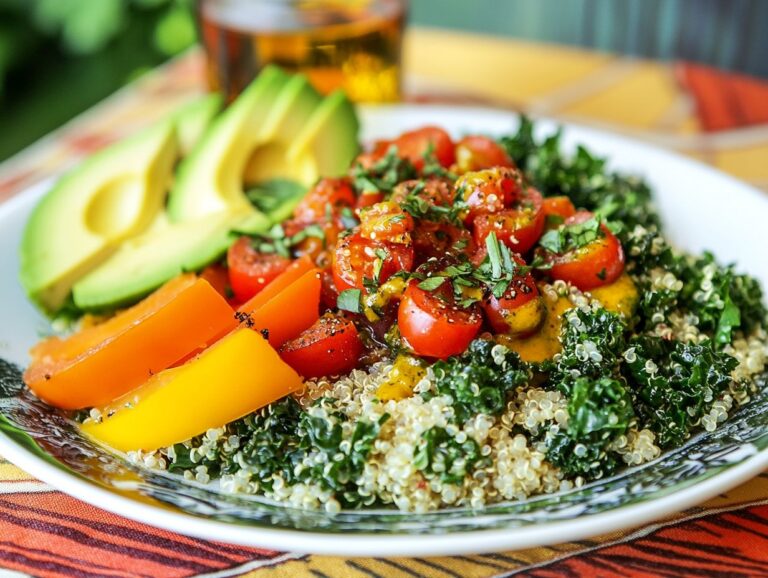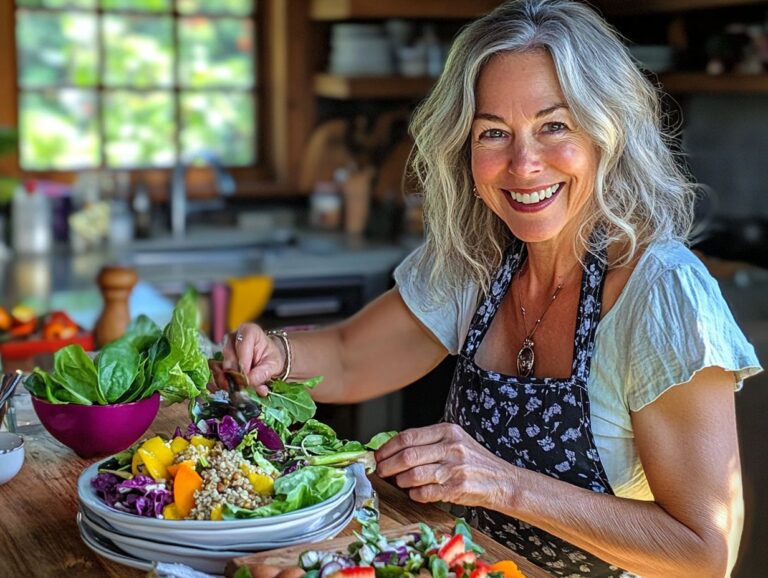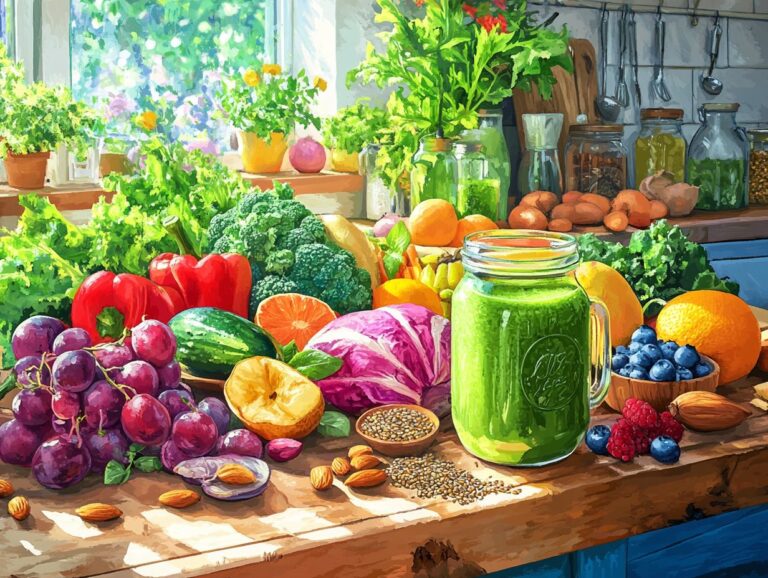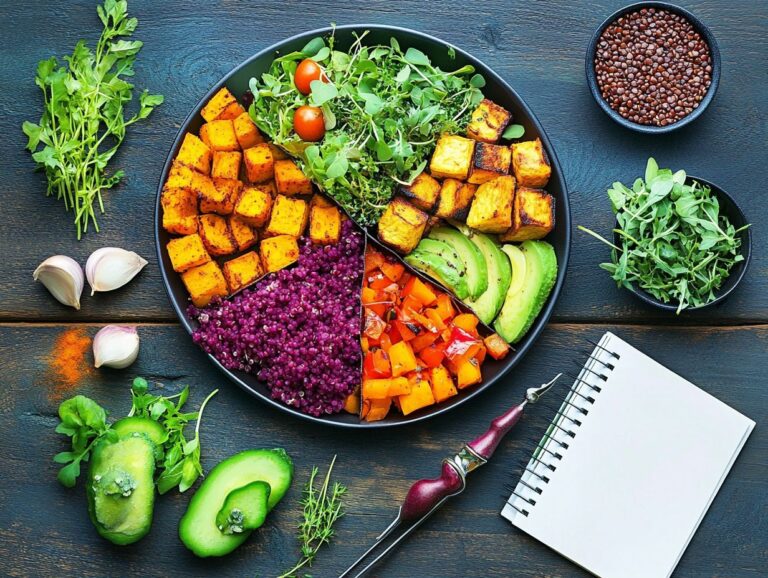It is indeed possible to build muscle on a plant-based diet. This article explores the essential components of a vegan muscle-building diet plan, discusses why a vegan lifestyle is suitable and effective for muscle growth, highlights key nutrients, identifies the best vegan foods, and provides a sample meal plan tailored to various fitness objectives, including weight loss, maintenance, and muscle gains.
Key Takeaways:
- A vegan diet can be suitable for building muscle due to its abundance of essential nutrients, including amino acids, vitamins, and minerals.
- Plant-based protein sources like tofu and lentils can provide the necessary protein for muscle growth.
- Adjusting a vegan muscle-building meal plan for different fitness goals, such as weight loss or gain, is possible and beneficial. Incorporating snacks and hydration strategies can help manage cravings and maintain daily intake without excess calories.
What Is a Vegan Muscle-Building Diet Plan?
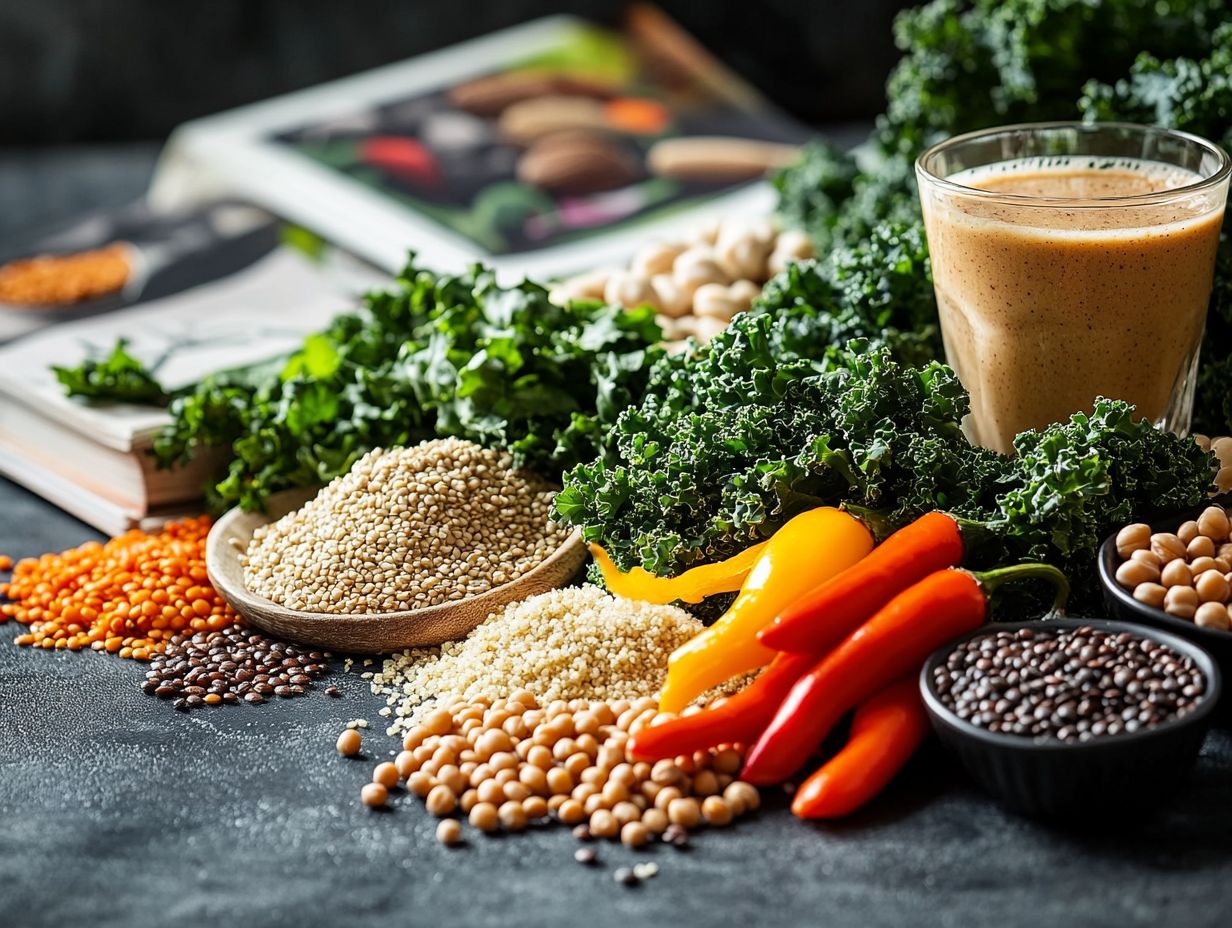
A vegan muscle-building diet plan is a nutritional strategy designed to help individuals, including athletes, gain muscle mass while following a plant-based lifestyle. This approach not only focuses on dietary choices but also emphasizes the importance of achieving a caloric surplus needed for muscle gain.
This diet emphasizes high-protein, plant-rich foods that provide essential amino acids, carbohydrates, healthy fats, vitamins, and minerals necessary for muscle recovery and growth.
By incorporating a variety of protein sources such as legumes, tofu, and tempeh, along with maintaining an adequate caloric surplus, individuals can effectively meet their protein requirements and support their bodybuilding and fitness goals without relying on animal protein. Additionally, research into plant-based diets continues to show their effectiveness in promoting muscle gain without compromising overall health.
Why is a Vegan Diet Suitable for Building Muscle?
A vegan diet is gaining recognition as a suitable option for muscle building due to its capacity to provide adequate protein and essential nutrients, along with overall health benefits. Influential figures like Arnold Schwarzenegger have advocated for plant-based eating, highlighting its benefits for both muscle and overall strength.
Unlike traditional diets that primarily rely on animal protein, a well-planned vegan diet incorporates a variety of sources such as legumes, grains, and tofu to deliver the necessary amino acids that support muscle growth and recovery.
Furthermore, plant-based diets are typically high in fiber and healthy fats, which contribute to improved digestion, increased energy levels, and enhanced athletic performance. This makes the vegan diet particularly popular among athletes focused on both endurance and strength.
What Are the Essential Nutrients for Muscle Growth on a Vegan Diet?
Necessary nutrients for muscle growth on a vegan diet include protein, carbohydrates, healthy fats, vitamins, and minerals, all of which play crucial roles in muscle recovery, energy production, and the overall functioning of the body.
A well-balanced vegan diet can fulfill these nutritional requirements through a variety of foods, such as legumes for protein, whole grains for carbohydrates, and nuts for healthy fats.
Understanding the significance of these nutrients enables athletes and fitness enthusiasts to optimize their diets, ensuring they consume adequate calories to achieve their muscle growth goals. Furthermore, the implementation of dietary supplements, such as vitamin B12, vitamin D, and creatine, can further support muscle recovery and performance.
1. Protein
Protein plays a crucial role in muscle growth and repair, making it an essential component of a vegan diet. It helps in repairing and building muscle tissues. Plant-based protein sources, such as legumes, tofu, tempeh, and grains, provide the amino acids necessary for muscle recovery and growth, enabling athletes to meet their protein needs without relying on animal products. Notable plant-based athletes like Patrik Baboumian and Kendrick Farris exemplify the effectiveness of these diets in achieving significant strength gains.
When examining various plant-based protein sources, it becomes evident that they have diverse amino acid profiles, which may sometimes lack one or more essential amino acids. By combining different sources, such as pairing rice with beans or nuts with seeds, individuals can achieve a complete amino acid profile essential for optimal health and fitness.
For those looking to boost their protein intake without significantly increasing their food volume, vegan protein powder supplements made from sources like peas, hemp, and brown rice can be beneficial. These supplements are convenient additions to smoothies, energy bars, and post-workout shakes, enhancing a balanced diet.
2. Carbohydrates
Carbohydrates play a crucial role in providing energy for strenuous exercise and building muscle mass, especially in vegan diets where energy sources may differ from those in non-vegan diets. Healthy carbohydrate sources such as whole grains, fruits, and legumes not only supply energy but also help maintain glycogen stores, which are essential for endurance and performance during resistance training.
These whole foods also offer a variety of vitamins, minerals, and fiber that contribute to overall health and recovery. The role of carbohydrates in muscle-building diets is further supported by ongoing studies, including those featured in documentaries like “The Game Changers.
The timing of carbohydrate consumption, particularly before and after exercise, can significantly enhance performance and promote effective muscle repair. Quick-digesting carbohydrates are particularly beneficial after workouts, as they swiftly replenish glycogen stores and aid in recovery and muscle synthesis.
Conversely, slow-digesting carbohydrates, such as those found in oats or brown rice, provide longer-lasting energy for prolonged activities. Therefore, athletes should pay attention to both the type and timing of these macronutrients to maximize their gains.
3. Healthy Fats
Healthy fats play a crucial role in a vegan diet as they provide essential fatty acids that help meet energy needs and support overall health. These factors are vital for muscle recovery and hormonal balance.
Sources of healthy fats, such as avocados, nuts, and seeds, not only improve the absorption of fat-soluble vitamins but also add extra calories necessary for achieving a caloric surplus required for muscle gain. Incorporating a wide variety of these nutrient-dense foods can positively impact one’s dietary profile. The significance of omega-3 fatty acids, as found in flaxseeds and chia seeds, plays a critical role in reducing inflammation and promoting muscle recovery.
For instance, using olive oil for cooking adds flavor and serves as a source of monounsaturated fats, which are beneficial for cardiovascular health. Chia seeds and flaxseeds are excellent sources of omega-3 fatty acids, which are important for reducing inflammation and promoting muscle recovery.
As a general guideline, it is recommended that approximately 20-35% of an individual’s daily caloric intake come from fats, ensuring a balanced mix of both omega-3 and omega-6 sources for optimal health and muscle-building functionality.
4. Vitamins and Minerals
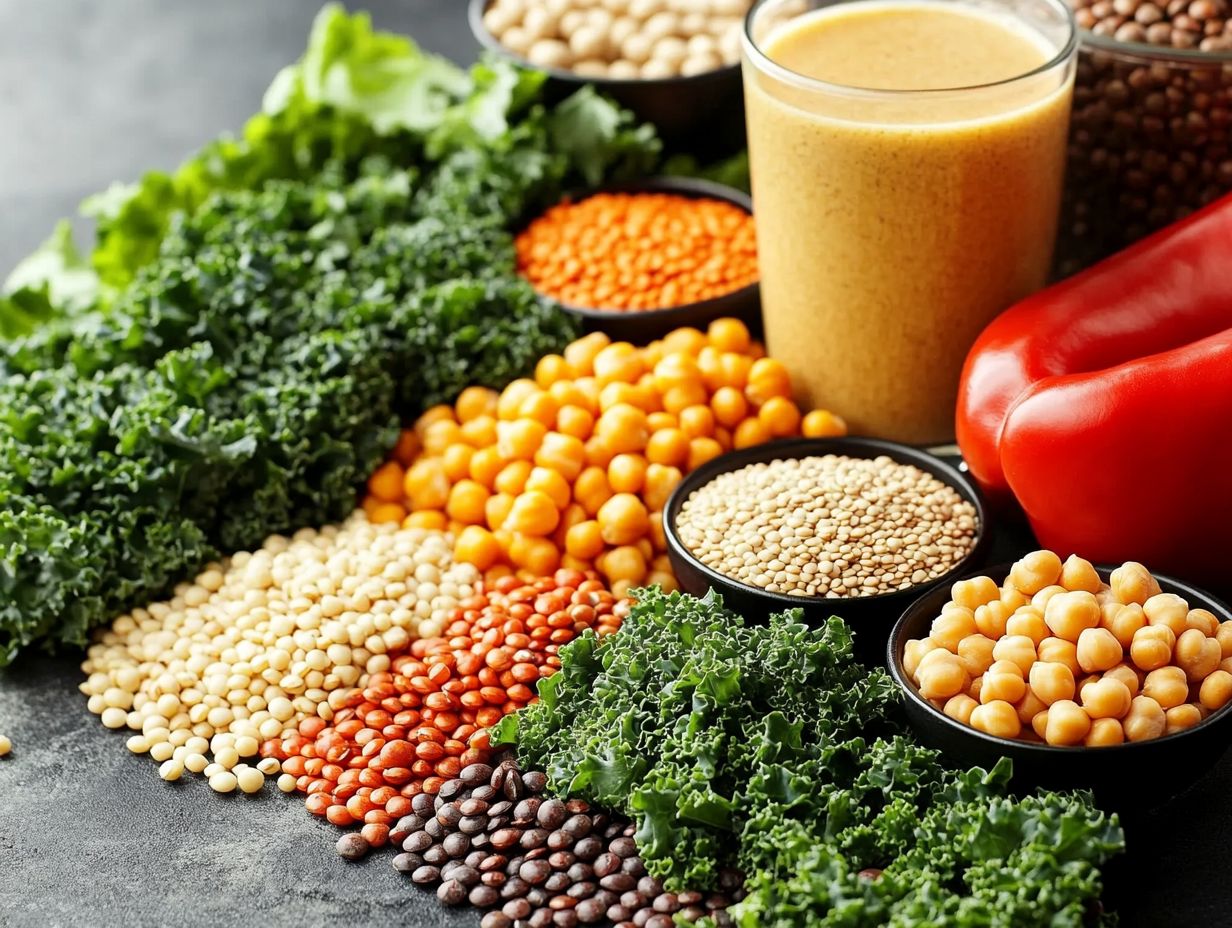
Micronutrients, including vitamins and minerals, are essential for overall health. In particular, nutrients such as vitamin B12 and iron are crucial for muscle growth and recovery in vegan diets. These micronutrients play significant roles in energy metabolism, red blood cell formation, and immune function.
Many individuals following a vegan diet often rely on fortified foods and supplements to ensure they meet their nutritional needs. While vitamin B12 and iron are two of the most critical micronutrients for muscle growth and recovery, it is important not to overlook others, such as calcium and magnesium, as well as omega-3 fatty acids, which are vital for muscle function and recovery.
Unfortunately, many people on vegan diets experience deficiencies in these essential vitamins and minerals, which can hinder optimal performance and muscle recovery. Incorporating a diverse range of plant foods, including nuts, seeds, legumes, leafy green vegetables, and whole grains, can help address these nutritional gaps.
Ongoing research into the specific needs of individuals on vegan diets is gradually leading to clearer guidelines regarding supplementation and dietary planning, helping individuals in achieving better muscle health and recovery. The inclusion of plant-based influences in professional sports teams, like the Tennessee Titans, underscores the effectiveness of such diets in enhancing athletic performance.
What Are the Best Vegan Foods for Muscle Building?
The best vegan foods for muscle building include legumes, tofu, tempeh, quinoa, nuts, seeds, and whole grains.
These foods are rich in protein and offer other essential nutrients that aid in muscle development.
1. Tofu
Tofu is a versatile and protein-rich food that serves as an excellent source of complete protein for vegans aiming to build muscle. Made from soybeans, tofu contains all the essential amino acids required for muscle growth and recovery, making it a staple in many vegan meal plans focused on fitness and bodybuilding.
Additionally, tofu is low in calories and rich in minerals like calcium and iron, which are vital for overall health. It comes in various forms, including firm, soft, and silken, allowing for a wide range of culinary applications. As a protein-rich option, tofu is essential for those aiming for muscle gain while adhering to a vegan diet.
Firm tofu is ideal for stir-fries and grilling, while soft or silken tofu can enhance smoothies or be blended into sauces. By incorporating tofu into salads, soups, and even desserts, individuals can enjoy its protein benefits while diversifying their meals.
This makes tofu not only a nutritious option but also an exciting ingredient for anyone looking to enhance their diet for muscle-building purposes.
2. Lentils
Lentils are a nutrient-rich source of plant-based protein and fiber, making them an excellent addition to a vegan muscle-building diet. They are high in iron and other essential nutrients, which aid in muscle growth while also promoting digestion and providing sustained energy for workouts. The high-protein content of lentils makes them a staple for achieving protein goals on a plant-based eating plan.
These small legumes come in various types, including green, brown, red, and black, each offering unique flavors and textures. Green lentils retain their shape well when cooked, making them ideal for salads, while red lentils break down quickly and are best suited for soups and stews.
Incorporating lentils into meals can significantly increase protein content. Filling dishes like lentil salads with vegetables or lentil curry served with quinoa are both high in protein and satisfying. Roasted lentils provide a crunchy texture, making them a great addition to buddha bowls. This versatile food is a testament to the varied protein-rich options available in a vegan diet.
Their versatility makes lentils an essential component of any muscle-building food regimen. The inclusion of lentils in meal plans can effectively support both weight gain and maintenance for those focused on bodybuilding.
3. Quinoa
Quinoa is often regarded as a superfood due to its status as a complete protein source, containing all nine essential amino acids necessary for muscle growth. This gluten-free grain boasts a high protein content along with an abundant supply of vitamins, minerals, and fiber, making it an excellent food choice for athletes and bodybuilders following a plant-based diet for optimal performance.
Quinoa is incredibly versatile and is utilized in a variety of culinary traditions; it can serve as a base for salads, be added to soups, or blended into smoothies, thereby enhancing the nutritional value of any meal.
Moreover, including quinoa in a post-workout meal can help replenish lost nutrients and aid in recovery. For vegan athletes, quinoa is a valuable resource for meeting daily dietary requirements and enhancing overall performance and strength, potentially aiding in muscle gain.
4. Nuts and Seeds
Nuts and seeds are nutrient-dense foods rich in healthy fats, protein, and essential vitamins, making them an excellent addition to any vegan muscle-building plan.
Foods such as almonds, chia seeds, and hemp seeds not only provide energy but also support muscle growth and recovery while adding variety to meals and snacks.
For instance, almonds are high in vitamin E and magnesium, both of which are crucial for muscle function and overall health. Meanwhile, chia seeds offer a complete protein source and are abundant in omega-3 fatty acids, which help reduce inflammation and promote recovery, enhancing endurance and performance.
Incorporating these powerhouse foods into your diet can be simple; for example, you can create a delicious almond butter smoothie by blending almond butter with plant-based protein powder, banana, and plant milk for a nutrient-rich post-workout drink.
Alternatively, a quick chia seed pudding made with coconut milk and topped with berries serves as a satisfying snack that fuels the body and aids in muscle repair.
5. Soy Milk
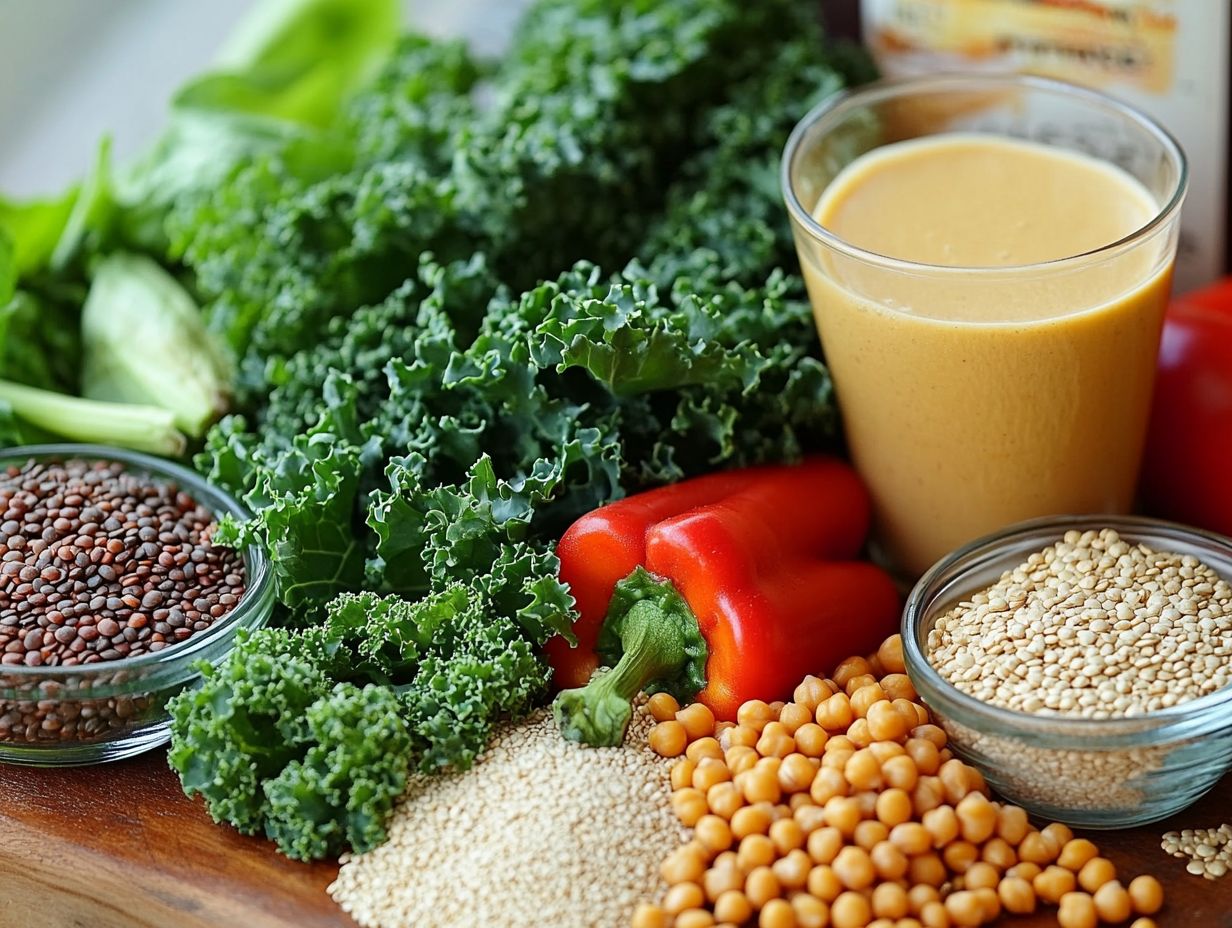
Soy milk is a popular dairy alternative that serves as a rich source of protein and essential nutrients, making it an excellent addition to a vegan muscle-building diet, especially for those looking to meet their protein goals without animal products.
Enriched with calcium and often fortified with vitamins, soy milk supports muscle growth and contributes to bone health, making it an ideal beverage choice for athletes.
Its versatility in the kitchen allows it to be seamlessly incorporated into a variety of dishes. From creamy smoothies that provide a delicious and nutritious start to the day to a base for cereals, soy milk enhances meals without sacrificing flavor.
It can also be used in savory recipes such as sauces, soups, and even baked goods, making it a staple for anyone following a plant-based lifestyle. This adaptability not only facilitates meeting dietary needs but also opens up a world of culinary possibilities for those embracing this vegan choice.
6. Spinach
Spinach is a leafy green powerhouse that is packed with vitamins, minerals, and antioxidants, all of which play a crucial role in muscle recovery, strength, and overall health within a vegan diet.
Rich in iron, calcium, and magnesium, spinach can help combat fatigue and enhance performance, making it an essential food for athletes focused on muscle building. This versatile vegetable is also abundant in vitamins A, C, and K, contributing to bone health and immune function.
By incorporating spinach into daily meals, individuals can effortlessly boost their nutrient intake. Whether blended into smoothies, tossed in salads, or sautéed as a delicious side dish, there are countless ways to enjoy spinach.
Including it in a balanced vegan diet not only aids in muscle growth and recovery but also provides essential nutrients that support overall vitality and well-being. Thus, spinach is a must-have ingredient for anyone serious about their health.
What Should a Sample Vegan Muscle-Building Meal Plan Look Like?
A sample vegan muscle-building meal plan includes a variety of nutrient-dense foods that supply sufficient protein, calories, and essential nutrients necessary for muscle growth, strength, and recovery, highlighting the importance of a well-balanced diet.
This plan can be customized to meet individual caloric needs and fitness goals, ensuring that meals are both balanced and delicious while emphasizing plant-based ingredients that support muscle gain.
1. Breakfast
Nutritionists emphasize that a nutritious vegan breakfast is crucial for providing energy and protein at the start of the day, which aids in muscle recovery and growth.
Some examples of healthy breakfast options include:
- Overnight oats made with chia seeds and almond milk
- A tofu scramble with vegetables
To ensure a well-balanced meal, a smoothie prepared with spinach, banana, and a scoop of pea protein can serve as a convenient, on-the-go choice.
For a breakfast rich in fiber and antioxidants, quinoa porridge topped with nuts and berries is an excellent option.
Additionally, a chickpea flour pancake filled with sautéed greens delivers both texture and flavor, making it a nutritious breakfast choice.
Vegan breakfast meals that support muscle building while ensuring satiety are among the best options for individuals following a vegan diet.
2. Snack
Roasted chickpeas are a nutritious option to include in a vegan muscle-building meal plan, thanks to their high protein and fiber content. A simple preparation method involves tossing canned chickpeas with olive oil and your favorite spices, then roasting them in the oven until they are crisp.
Chia seed pudding is another excellent choice, as it provides a good source of omega-3 fatty acids, which help reduce inflammation and enhance muscle recovery. To make chia seed pudding, mix chia seeds with almond milk and let the mixture sit overnight.
Edamame, when steamed and lightly salted, serves as a fantastic post-workout snack for refueling. Experts emphasize that snacking between meals is a vital component of a muscle-building meal plan, as it helps enhance protein and energy intake.
Other nutritious snacks, like nut butter on whole grain toast or hummus with raw vegetables, can also help maintain energy levels and support muscle recovery.
3. Lunch
A balanced vegan lunch should provide sufficient protein, healthy carbohydrates, and essential nutrients to sustain energy levels throughout the afternoon.
Timing your lunchtime meal can aid in recovery from morning workouts and prepare you for any afternoon exercise.
Including protein-rich ingredients such as edamame, tempeh, or black beans can enhance overall protein intake while offering a variety of healthy nutrients.
Pairing proteins with complex carbohydrates like brown rice or whole grain bread creates a nutritionally balanced meal that supports muscle gain.
It is important to monitor portion sizes, as adequate calorie intake is necessary for muscle growth.
A filling and energizing lunch can take the form of roasted vegetable bowls or hearty soups.
4. Pre-workout Snack
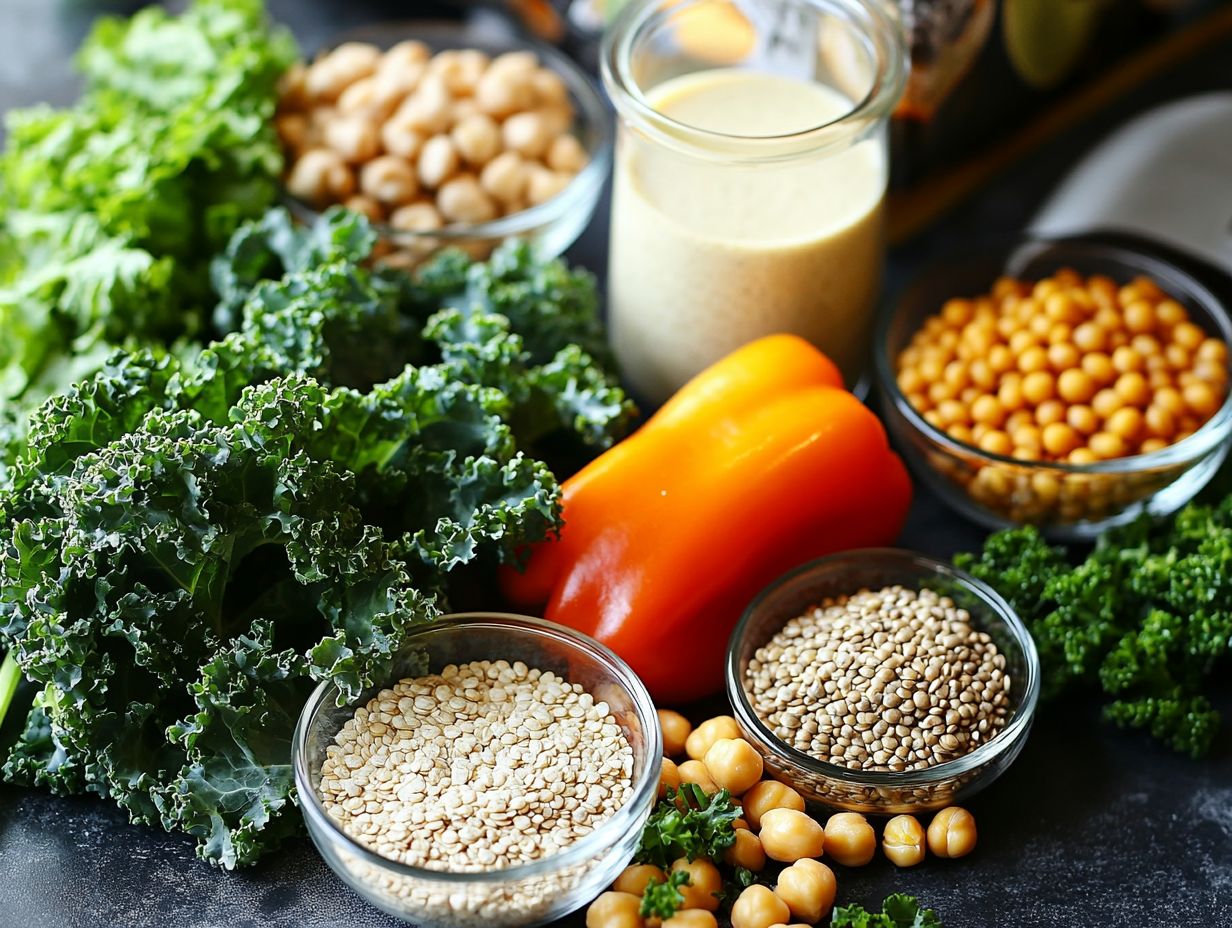
Pre-workout snacks are essential for providing the energy and nutrients that the body needs to perform optimally during exercise, especially in a vegan diet.
Options such as a banana with almond butter or a protein smoothie made with soy milk offer the necessary fuel for intense training sessions. Timing is also crucial; pre-workout snacks should be consumed at least 30 to 60 minutes before exercising.
These easy-to-prepare snacks, which are high in carbohydrates and protein, help maintain energy levels and play a significant role in muscle recovery and growth.
For example, oats with a spoonful of plant-based protein or whole-grain toast topped with smashed avocado and seeds are two simple, carbohydrate-rich, and protein-packed options that can enhance performance.
When the body receives the right nutrients at the right time, it leads to improved endurance, muscle gains, and weight maintenance, especially when combined with effective resistance training.
5. Dinner
Dinner for vegans should be a nutritious meal that not only concludes the day but also supports muscle recovery and repair.
A stir-fry featuring tempeh, broccoli, and brown rice or a hearty bean chili made with kidney beans, black beans, and pinto beans can be excellent options.
Incorporating a diverse array of legumes, whole grains, and leafy greens can significantly enhance the meal’s nutritional profile.
To provide the necessary protein and healthy fats for recovery, consider adding a quinoa and black bean salad topped with avocado, which is both nutritious and satisfying.
Grilling or roasting vegetables can enhance their flavors while maintaining their health benefits.
Additionally, including spices such as turmeric and ginger, which may possess anti-inflammatory properties, is a beneficial practice.
As a general guideline, aim to balance carbohydrates and proteins with healthy fats for a well-rounded meal.
6. Post-workout Snack
A post-workout snack is essential for muscle recovery and replenishing energy stores after strenuous exercise, particularly for those following a vegan diet focused on muscle building.
Options such as a smoothie made with pea protein, fruit, and spinach, or whole-grain toast topped with avocado and nutritional yeast, offer the necessary nutrients to support muscle recovery and growth.
Timing is crucial; consuming these snacks within 30 to 60 minutes after exercising allows the body to take advantage of the anabolic window, maximizing recovery.
For individuals aiming to build muscle on a plant-based diet, it is important to combine high-quality protein with complex carbohydrates.
For instance, a banana paired with almond butter provides quick-release energy along with healthy fats, while energy balls made from oats, dates, and chia seeds serve as a delicious, nutrient-dense option that satisfies sweet cravings while delivering a boost of protein and fiber.
These simple recipes make it easier to maintain a consistent post-workout regimen, ensuring that athletes can meet their daily nutritional needs.
How to Adjust the Plant-Based Diet Plan for Different Fitness Goals?
A vegan muscle-building diet plan can be tailored to accommodate various fitness goals, including weight loss, weight maintenance, and weight gain, ensuring optimal performance for both endurance and resistance training.
Each of these objectives necessitates specific caloric intakes and macronutrient ratios, allowing individuals to adjust their meal plans accordingly for optimal results.
1. Weight Loss
For those interested in losing weight on a vegan diet, it is important to create a caloric deficit without compromising muscle maintenance. To achieve this, prioritize nutrient-dense, lower-calorie options such as vegetables, legumes, and whole grains.
These foods help ensure a caloric deficit while providing adequate protein intake, which is essential for muscle retention. Portion control is also necessary for optimal results, as it allows individuals to enjoy a diverse range of foods without overconsumption.
High-fiber options, including beans, legumes, and whole grains, promote a sense of fullness, which enhances adherence to the meal plan. Additionally, protein-rich foods like tofu, tempeh, and seitan can help preserve muscle during weight loss and have been shown to contribute to feelings of fullness.
This approach not only extends the sensation of satiety but also ensures that nutritional needs, including essential vitamins and minerals, are met, making weight loss healthier and more sustainable.
2. Weight Maintenance
Weight maintenance on a vegan diet involves carefully adjusting caloric intake and activity levels to meet energy requirements without consuming excess calories, ensuring that protein timing and dietary balance are maintained.
Emphasizing a diverse range of plant-based foods that provide adequate nutrients, including carbohydrates, proteins, and healthy fats, while allowing for small fluctuations in caloric intake can help achieve this goal.
To do this effectively, it is essential to understand macronutrient distribution, which entails a balanced intake of carbohydrates, proteins, and healthy fats, ensuring the body’s nutritional and energy needs are met.
- Carbohydrates should come from whole grains, fruits, and vegetables.
- Proteins should be sourced from legumes, nuts, and seeds.
- Healthy fats, found in avocados, olive oil, and nuts, are also vital for overall health.
Additionally, regular physical activity, including strength and endurance workouts, can boost metabolism and promote muscle maintenance, both of which contribute to effective weight management.
By combining mindful eating habits with consistent exercise, individuals can maintain a healthy weight while enjoying the diverse flavors of a vegan diet, similar to athletes like Patrik Baboumian and Kendric Farris, who thrive on plant-based diets.
3. Weight Gain
Vegans who want to gain weight need to consume more calories than they burn in order to build muscle and support overall growth. This can be achieved by incorporating calorie-dense foods into their diet, such as nuts, seeds, avocados, and whole grains, while ensuring that protein goals are met for muscle development.
Meal frequency is also important; eating smaller meals more frequently throughout the day can help maintain a steady flow of calories. Snacks like:
- nut butter on whole-grain toast,
- energy bars made from oats and dried fruits,
- smoothies with plant-based protein powder
can significantly enhance daily caloric intake. Additionally, foods rich in healthy fats, such as coconut milk, tahini, and olives, can contribute to overall caloric consumption.
If gaining weight through whole foods alone proves challenging, supplements like protein shakes, creatine, or weight gain powders can be utilized to bridge the gap, ensuring dietary supplements meet vitamin B12, vitamin D, and iron needs.
